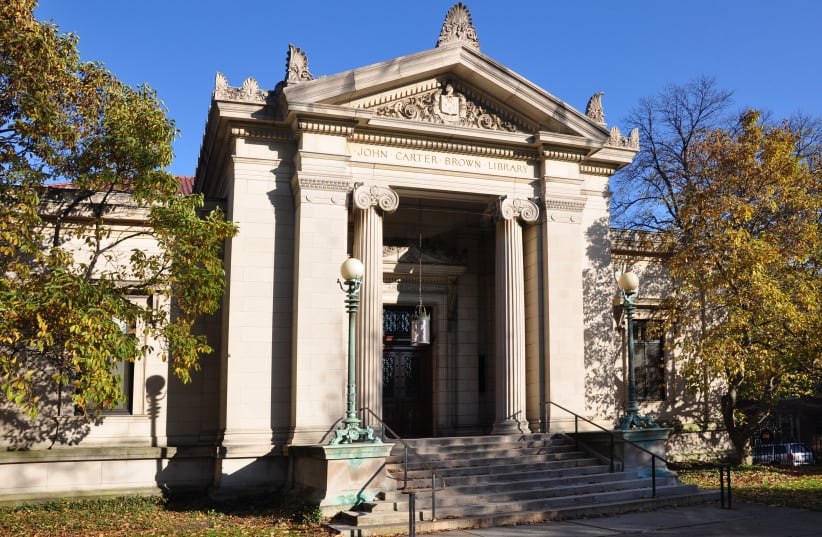The referendum is non-binding and does not require the university to act. And in an email to the Brown community, President Christina Paxson wrote that the university would not use its investments to make political statements."Brown's endowment is not a political instrument to be used to express views on complex social and political issues, especially those over which thoughtful and intelligent people vehemently disagree," she wrote. "As a university, Brown's mission is to advance knowledge and understanding through research, analysis and debate. Its role is not to take sides on contested geopolitical issues."But the vote sparked a debate on campus and in the wider community about the Israeli-Palestinian conflict and anti-Semitism.The referendum was supported by 69 percent of the student voters — some 42 percent of Brown's undergraduates voted. The question was included on a ballot for the Undergraduate Council of Students' annual election of officers. Students voted from Tuesday through Thursday, and the results were announced Thursday night."It's antisemitic," Mary Greene, president of the Rhode Island Coalition for Israel, a group of Christians and Jews that advocates for Israel around the state, said of the referendum. "That's the root of it."But student supporters of the referendum rejected that notion, saying that their arguments were not antisemitic or even anti-Israel, but rather a critique of certain policies and actions carried out by the Israeli government against Palestinians."We have to really, really remember that criticism of government policy is not anti-Semitic," said Drashti Brahmbhatt, 21, a senior at Brown. "We are specifically talking about and criticizing a government policy."Brahmbhatt, who said she took a trip with a class to Israel and Palestine during the 2016-17 winter session, said she is concerned about specific human-rights abuses in the region, such as the maintenance and expansion of Israeli settlements in the West Bank and East Jerusalem, the construction of a separation wall running along the West Bank, and violent crackdowns by the Israeli military on Palestinian protestors."All these human-rights abuses are firmly based in international human-rights law," said Brahmbhatt, adding that the companies named in the referendum also supply equipment used in other conflict areas.For example, she said, Safariland, a global provider of law-enforcement products, manufactures tear gas that has also been used against migrants along the US-Mexico border.Safariland did not respond to an email seeking comment."This applies to any region in the world," Brahmbhatt said.But Greene said these actions by Israel should be considered self-defense, not abuses of human rights."Those walls have to be up, because of the terrorism by the Palestinians," she said.And the Israeli military must crack down on protesters in order to protect the country's citizens, she said."They are basically defending their rights as a state, and they have law enforcement just like we do," she said. "And people have no right to go over there and do terroristic things to the people living in Israel."Hewlett-Packard Inc., one of the companies named by students in the referendum, said in a statement that the allegations that the company is complicit in human-rights abuses are false."HP Inc. has no contracts associated with technology used at security crossings, or with generating identification cards, and has no operations in settlements in the Occupied Territories," the statement says. "HP Inc. is strongly committed to socially responsible business practices and abides by stringent policies that respect human rights in every market in which we operate."Sam Frolichstein-Appel, 21, a Brown senior who supported the referendum, said that as a Jew, he finds it especially difficult to watch the conflict unfold in the Middle East."I think for people who have been oppressed so much and persecuted and killed throughout history, it's really, really disheartening, to say the least, to see Jews doing the same thing to other people," he said.But in a letter to the editor published in the Brown Daily Herald on Thursday, a group of Jewish students wrote that the campaign supporting the referendum, called Brown Divest, did not take the Israeli perspective into account."We acknowledge the suffering of Palestinians, but Brown Divest ignores the fact that innocent Israeli citizens feel the pain of the conflict in the form of countless suicide bombings, stabbings, kidnappings and other terror attacks," the letter says. "The divestment referendum places the blame for the current conflict on Israel, but in reality both sides share blame."In addition to Paxson's statement, Brown spokesman Brian Clark said he could not disclose whether the university currently invests in any of the companies named by students in the referendum."We don't share information on our specific investment publicly because we're seeking to maintain our competitive advantage," he said.In a post on the Facebook page for Brown Divest, students wrote that they were disappointed by Paxson's response."The history of activism on Palestine is dotted with similar instances, when democracy is pushed aside to stifle Palestinian voices," the statement says. "We never expected the fight for divestment and financial transparency to be easy, and we do not see last night's victory as an end to our struggle."Greene said she sees the vote at Brown as an opportunity to open up a dialogue about Israel with students and hoped the Rhode Island Coalition for Israel would be able to express its views on campus."I love the Palestinians, and I love the Israelis," she said. "I love every group of people."———©2019 The Providence Journal (Providence, R.I.). Distributed by Tribune Content Agency, LLC.Victory! Congratulations to the students with #BrownDivest and SJP on the passage of their divestment referendum by an overwhelming margin! https://t.co/hnbzXiVdbJ
— BDS movement (@BDSmovement) March 22, 2019
Brown students ask to divest from Israeli 'human-rights' abusing companies
"It's antisemitic," Mary Greene, president of the Rhode Island Coalition for Israel, a group of Christians and Jews that advocates for Israel, said of the referendum. "That's the root of it."
